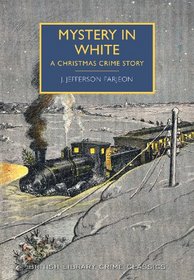Mildly intriguing premise, mired down by terrible writing.
I made it as far as I did -- page 92 --because I wanted to see where Farjeon would go with it -- for this, I thought, I was willing to suffer the awful, droning dialogue (literally pages-ful of exchanges like "What do you mean?" "What are you saying?" "WHAT??") and characters that are ghastly stereotypes. (Particularly found the brother/sister combo, the two supposedly "bright young things," very resistible ...)
But it was the appearance of a Cockney villain, straight from 1930s B-movie Central Casting, that finished things for me ... Some authors can do so-called dialect. Farjeon cannot.
I made it as far as I did -- page 92 --because I wanted to see where Farjeon would go with it -- for this, I thought, I was willing to suffer the awful, droning dialogue (literally pages-ful of exchanges like "What do you mean?" "What are you saying?" "WHAT??") and characters that are ghastly stereotypes. (Particularly found the brother/sister combo, the two supposedly "bright young things," very resistible ...)
But it was the appearance of a Cockney villain, straight from 1930s B-movie Central Casting, that finished things for me ... Some authors can do so-called dialect. Farjeon cannot.
Despite the cover of the British Library Crime Classics edition, 90% of the "action" takes place in a secluded house, not on a snowbound train. But the location isn't all that crucial in any case. The writing is fine, characters (quickly fleshed out) are serviceable, but the overall feeling I got from it (besides that it seemed to go on forever) was one of indifference. The killings are unconnected, and characters with important pieces of the puzzle enter very late in the story. Not a great example of the classic British murder mystery.




